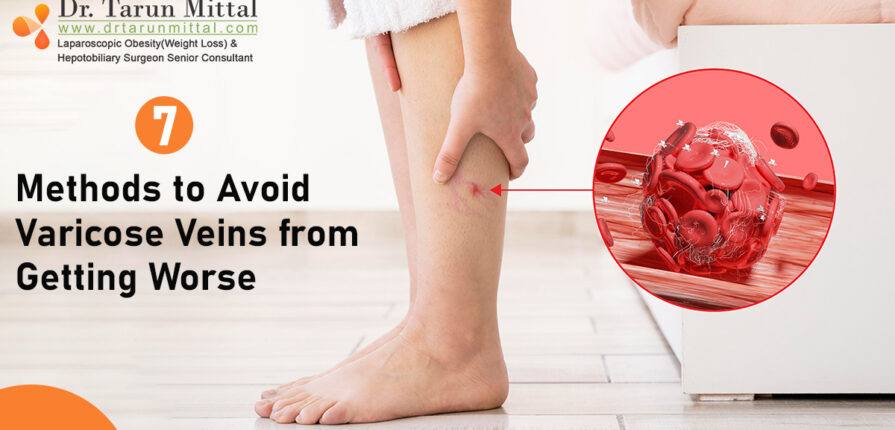Varicose veins are enlarged, swollen, and twisted veins that typically appear dark purple or blue in colour. They often occur in the legs and can cause discomfort, pain, and cosmetic concerns. Your actions may occasionally be limited by varicose veins. Long durations of sitting or standing may increase your symptoms while lying down or elevating your feet may alleviate them. Being overweight is one of the biggest causes of varicose veins. Excess weight can put stress on the veins, specifically in your legs. If you are looking for the best weight loss treatment or varicose veins treatment in Delhi NCR, Dr Tarun Mittal’s weight loss clinic is the place to go. With years of practice in treating weight-related problems, Dr Tarun Mittal provides comprehensive patient-centred care effectively curing the disease and preventing the symptoms from reappearing again in future. By receiving treatment for varicose veins as soon as possible, you can prevent consequences like ulceration and bleeding from worsened varicose veins.
Varicose veins can be uncomfortable and unsightly, but there are several methods you can adopt to prevent them from worsening and alleviate symptoms.
Here are seven effective strategies to prevent varicose veins from getting worse:
Regular Exercise
Regular physical activity is essential for maintaining healthy circulation and preventing varicose veins from worsening. Engage in activities that promote leg muscle strength and flexibility, such as walking, cycling, swimming, or yoga. Exercise helps improve blood flow and reduce pressure on the veins, thereby alleviating symptoms and preventing further deterioration.
Maintain a Healthy Weight
Excess weight places added strain on the veins, especially in the legs. Maintaining a healthy weight through a balanced diet and regular exercise can help alleviate pressure on the veins and prevent varicose veins from worsening. Focus on consuming a diet rich in fruits, vegetables, whole grains, and lean proteins while minimizing processed foods and sugary snacks.
Elevate Your Legs
Elevating your legs above heart level periodically throughout the day can help reduce swelling, alleviate discomfort, and improve circulation in the legs. Whenever possible, prop up your legs on a stack of pillows or a footstool while sitting or lying down. Elevating your legs allows gravity to assist in the return of blood flow to the heart, reducing pressure on the veins.
Wear Compression Stockings
Compression stockings provide graduated pressure to the legs, helping to support the veins and improve circulation. They can help prevent blood from pooling in the veins and reduce the symptoms associated with varicose veins, such as swelling and discomfort. Wear compression stockings regularly, especially during periods of prolonged standing or sitting, to prevent varicose veins from worsening.
Avoid Prolonged Standing or Sitting
Prolonged periods of standing or sitting can exacerbate varicose veins by increasing pressure on the veins and impeding blood flow. Whenever possible, take breaks to walk around and stretch your legs throughout the day. If you have a desk job that requires prolonged sitting, make a conscious effort to stand up, stretch, and move around at regular intervals to promote circulation.
Practice Good Posture
Maintaining good posture while standing and sitting can help improve blood flow and alleviate pressure on the veins in the legs. Avoid crossing your legs while sitting, as this can restrict blood flow and exacerbate varicose veins. Instead, sit with your feet flat on the floor and your legs uncrossed to promote optimal circulation.
Stay Hydrated and Follow a Healthy Diet
Drinking an adequate amount of water and following a nutritious diet can support overall vascular health and prevent varicose veins from worsening. Stay hydrated by drinking plenty of water throughout the day, as dehydration can contribute to poor circulation and exacerbate vein problems. Additionally, include foods rich in fibre, antioxidants, and vitamins C and E in your diet to support vascular health and minimize inflammation.
Conclusion By incorporating these strategies into your daily routine, you can help prevent varicose veins from worsening and alleviate symptoms associated with this common vascular condition. In severe cases, medical interventions such as vein stripping, sclerotherapy, laser therapy, or radiofrequency ablation may be recommended to treat varicose veins and improve circulation. If you experience persistent pain, swelling, or discomfort related to varicose veins, consult Dr Tarun Mittal for personalized treatment recommendations.


